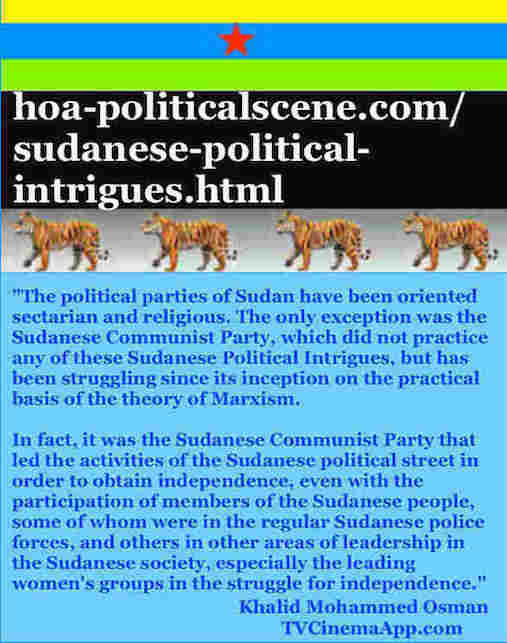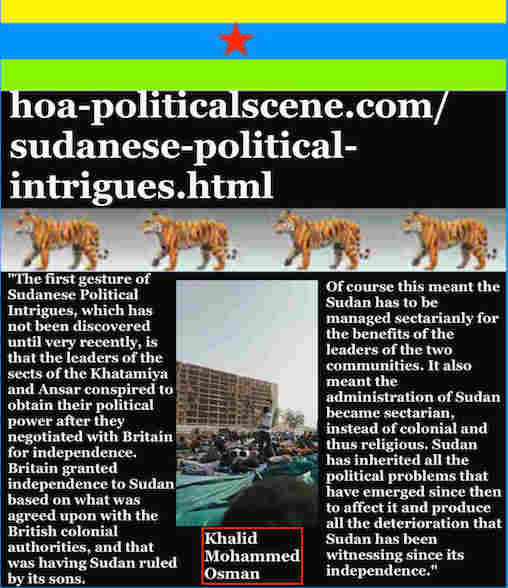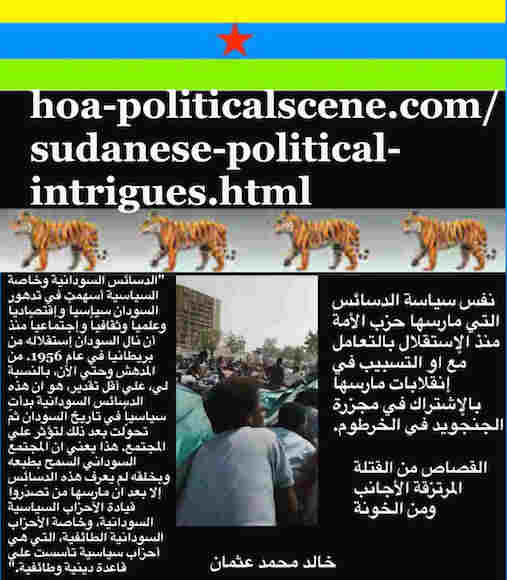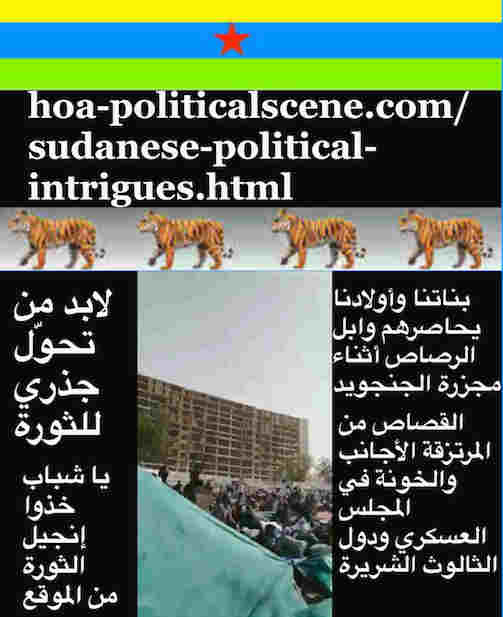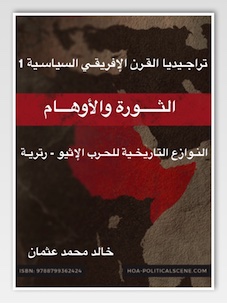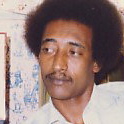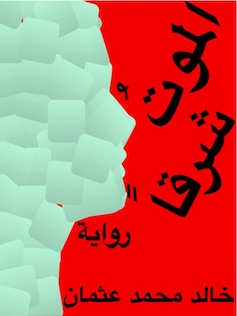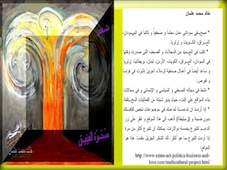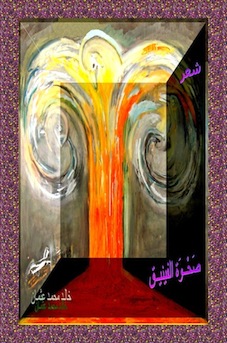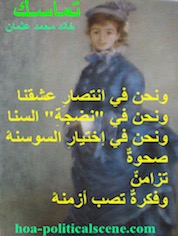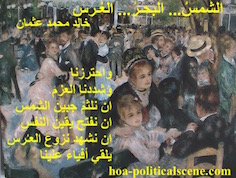Sudanese Political Intrigues!
The Sudanese intrigues, especially the Sudanese Political Intrigues, have contributed to the deterioration of Sudan politically, economically, scientifically, culturally and socially since Sudan gained independence from Britain in 1956.
Arabic readers, please scroll downstairs to the Arabic section of the page below the English version and don't forget to comment and share the page. Thank you.
These political intrigues have been made by political parties, especially the religious and sectarian parties and they have continued to hurt Sudan very much, endanger it and destroy its stability.
It is surprising, and so far, to me, at the very least, that these Sudanese intrigues began politically in the history of Sudan and then turned to affect the society. The society has never known such intrigues, before the religious and sectarian parties practiced them.
This means that the Sudanese society, by its natural virtues and its ethics, did not know these intrigues until they were practiced by the leaders of the Sudanese political parties and especially the Sudanese sectarian parties, which are political parties founded on a religious and sectarian basis.
The Sudanese Political Intrigues During the Independence!
The first gesture of Sudanese Political Intrigues, which has not been discovered until very recently, is that the leaders of the sects of the Khatamiya and Ansar conspired to obtain their political power after they negotiated with Britain for independence. Britain granted independence to Sudan based on what was agreed upon with the British colonial authorities, and that was to have Sudan ruled by its sons.
Of course this meant that the Sudan has to be managed sectarianly for the benefits of the leaders of the two communities. It also means the administration of the Sudan became sectarian, instead of colonial and thus religious. Sudan has inherited all the political problems that have emerged since then to affect it and produce all the deterioration that Sudan has been witnessing since its independence.
The political parties of Sudan have been oriented sectarian and religious. The only exception was the Sudanese Communist Party, which did not practice in any of these Sudanese Political Intrigues, but has been struggling since its inception on the practical basis of the theory of Marxism.
In fact, it was the Sudanese Communist Party that led the activities of the Sudanese political street in order to obtain independence, even with the participation of members of the Sudanese people, some of whom were in the regular Sudanese police forces, and others in other areas of leadership in the Sudanese society, especially the leading women's groups in the struggle for independence.
As the world realized at the time the emergence of communist political parties in colonial countries in the Middle East and Africa, as well as the growing influence of these communist parties to lead the stages of independence, and was aware of the emergence of Muslim Brotherhood parties at the same time, the imperialist forces preferred to deal with parties of backwardness such as the religious and sectarian parties.
The two sectarian parties might not have been aware of the relationship of the Sudanese Muslim Brotherhood with the Muslim Brotherhood parties in other countries in the region, or perhaps might have ignored the relationship for joint political actions.
This is an indication of religious convergence, especially since there was a communist party led by socialist intellectuals who have popular beliefs that might find huge acceptance from the masses because they work for the masses and do not celebrate the Islamic faith in political affairs.
The Sudanese Political Intrigues in the Framework of Religious & Sectarian Parties!
This was the third indicator at the beginning of the Sudanese Political Intrigues among these politically and intellectually backward parties.
They continued working on the popular dependence of the two sects emotionally by the influence of religion and the policy of absenting the Sudanese political mentality to achieve many sectarian loyalties among the Sudanese people.
Such Sudanese political intrigues have worked well for them to dominate the Sudanese political scene in the following periods after independence.
The Muslim Brotherhood, in turn, benefited from this rapprochement between the two sects. The Muslim Brotherhood leader later sought to marry one of the first family women who led the Ansar sect. This marriage of convenience for political interests has pitted the cooperation between the Umma Party and the Muslim Brothers Party.
In this way, the political affairs have shifted from public state affairs for the masses to the interests of the first big families whose members control these parties. All Sudanese policy has been directed to serve three families in Sudan through all of the political periods that have passed through the country.
In lights of this political indicator, the Sudanese Political Intrigues continued between the underdeveloped parties to work always to control the course of the Sudanese policy and to work on beating the Sudanese Communist Party, or cracking its wings.
Sudanese Political Intrigues to Distort the Image of Communist Party!
The Sudanese Political Intrigues are many in this regard, but the most important is to distort the image of the Communist Party in the minds of the Sudanese people by saying that it is an atheist party. They knew that this claim in a society that expresses Muslim beliefs has a significant impact that is negatively reflecting on the Sudanese Communist Party.
In lights of the indicators that I spoke about in terms of the Sudanese machinations carried out by these right-wing parties, the beating of the Communist Party was not the only planned policy against this leftist progressive party. The general political orientation was the making of political mentality absenteeism among the public to affect the Sudanese people by political ignorance, and so far for as long as possible.
Here, if you have lived in those periods, you will see how large sections of the Sudanese society in various regions of the Sudan have been fully loyal to the leaders of the sectarian parties. Even the poor people have used to pay vows to the mottos of the masters and the ladies from the long-lasting fatigue of their livelihood. Some of them were working in the service of gentlemen in their homes and fiefdoms.
How the Muslim Brothers Developed the Sudanese Political Intrigues?
That Sudanese human misery was accompanied by the policy of the absence of the Sudanese political mindset, which has been working to keep the masses in this framework of political ignorance to serve the interests of sectarian feudalists. The Muslim Brotherhood took the gauntlet to walk the people on the path of the same policy of mental disorientation by using the same Islamic claims, which were still cheating some of the masses.
Since the policy of absenting the Sudanese political mentality is an essential part of the Sudanese Political Intrigues carried out by the right-wing parties combined, which benefited the Muslim Brotherhood, the Muslim Brothers Party outweighs the sectarian parties in using the Sudanese Political Intrigues and weaving all of that in the context of the absenteeism of political mentality on two sides.
The first aspect was directed towards the masses to contribute with sectarianism in the absenteeism of political mentality. The second perpetrated to use the same policy to strike the sectarian parties, by indicating that the Muslim Brothers Party is the only one that cares about Islam, because as it claimed to be non-sectarian.
The Brotherhood Party has succeeded in overtaking the sectarian parties in the use of Sudanese Political Intrigues and weaving them in its own way. The party benefited from these intrigues carried out by the sectarian parties to plan a policy of burning the political stages. It did so with the aim of burning the sectarian parties at the same time in Sudan's political scene, which has been a resounding success.
In addition, the Muslim Brotherhood Party outweighs the sectarian parties in using the Sudanese Political Intrigues to create the party's octopus arms at every stage, in every decade to implement part of its policies at that stage. In other words, it has used political pragmatism to prevail over those political stages in Sudan.
Not only that, but the Brotherhood party has planned many Sudanese Political Intrigues, since its inception in the forties according to a conspiracy theory through which it built the Muslim Brother's Conspiracy Theory to implement its interim policies, and where the party led the stages of democracy in Sudan to a dead end with the sectarian parties.
Then it blamed the sectarian parties for the deterioration of Sudan to enable the army to strike democracy by military coups at every stage and almost every decade. When that resulted into changes between democracy and dictatorship, more than once, the party with the third penultimate version of it which has taken as the National Islamic Front (NIF) orchestrated the last military coup in 1989 to bring Omar al-Bashir with other elements of the Muslim Brothers in the army to power and to continue in power for thirty years.
The Muslim Brothers are Leading the Sudanese Political Intrigues Forward!
When the Sudanese people continued to stage the Sudanese intifada, the party shifted policies using the same Muslim Brothers' octopus arms to create another arm called the People's Conference Party to claim that it opposes the National Congress Party in power.
When the Sudanese protests continued, the party chose to be in the opposition further to deceive the masses. When the Sudanese revolution witnessed some progress and the party knew that great knowledge about its plans have been distributed by Sudanese intellectuals to the people, the party played to clutch the activities of the Sudanese rising people.
When the Sudanese uprising people entered the headquarters of the army and achieved the sit-in there, all the Muslim Brothers came again together to support the Transitional Military Council that has emerged to assume power after the fall of the regime to preserve the infrastructure of the collapsed regime.
Not only that, but they support the Janjaweed forces, which has taken the name of the rapid support forces during Omar al-Bashir's totalitarian regime. This is because they have established the Janjaweed from foreign mercenaries while they were leading that military religious regime to commit the genocide in Darfur.
They support them still and they planned the people's massacres that have occurred on June 03, 2019 during the people's sit-in in the army general command, where they have killed thousands of people, some of whom being burned alive, thrown while tied with heavy materials to be drown alive and raped many women, including child girls and grandmas.
الدسائس السياسية السودانية - Sudanese Political Intrigues - بدأتها الأحزاب الدينية الطائفية، فأسهمت في تدهور السودان
الدسائس السودانية وخاصة الدسائس السياسية السودانية أسهمت في تدهور السودان سياسياً وإقتصادياً وعلمياً وثقافياً وإجتماعياً منذ أن نال السودان إستقلاله من بريطانيا في عام 1956. من المدهش وحتي الأن، بالنسبة لي، علي أقل تقدير، هو ان هذه الدسائس السودانية بدأت سياسياً في تاريخ السودان ثمّ تحوّلت بعد ذلك لتؤثر علي المجتمع. هذا يعني ان المجتمع السوداني السمح بطبعه وبخلقه لم يعرف مثل هذه الدسائس إلا بعد ان مارسها من تصدّروا قيادة الأحزاب السياسية السودانية (Sudanese Political Parties)، وخاصة الأحزاب السودانية الطائفية، التي هي أحزاب سياسية تأسست علي قاعدة دينية وطائفية.
المكائد السياسية السودانية - Sudanese Political Intrigues - في غضون ترتيبات الإستقلال
أول بادرة للمؤامرات السياسية السودانية، والتي لم تُكتشف إلا مؤخراً جداً، هي ان القائدين لطائفتي الختمية والإنصار تآمرا من أجل الحصول علي قوتهما السياسية بعد ان تحاورا مع بريطانيا للحصول علي الإستقلال، ومنحت بريطانيا السودان إستقلاله بناءاً علي ما تمّ الإتفاق حوله مع السلطات الإستعمارية البريطانية، لتتم إدارة السودان بيد أبنائه، وبطبيعة الحال كان ذلك يعني ان تتم إدارة السودان طائفياً لصالح قائدي الطائفتين. ذلك أيضاً يعني إدارة السودان طائفياً وبالتالي دينياً، مما أورث السودان كلّ المشاكل السياسية، التي ظهرت منذ ذلك الحين لتؤثر في هذا التدهور، الذي ظلّ السودان يشهده منذ إستقلاله.
وبذلك فقد تمّ توجّه الأحزاب السياسية السودانية طائفياً ودينياً. الإستثناء الوحيد كان هو الحزب الشيوعي السوداني والذي لم يمارس أيّاً من تلك المؤامرات السياسية السودانية (Sudanese Political Intrigues)، بل ظلّ يناضل منذ نشأته علي قاعدة الأساس العملي للنظرية الماركسية. وفي الواقع كان الحزب الشيوعي السوداني هو الذي يقود فعاليات الشارع السياسي السوداني من أجل الحصول علي الإستقلال، حتي بمشاركة أفراد من الشعب السوداني الطليعيين الذين كان بعضهم في القوات النظامية، وبعضهم الآخر في مجالات قيادة أخري في المجتمع السوداني، خاصة الفئات النسوية الطليعية في نضال مرحلة الإستقلال.
ولما كان العالم يدرك في ذلك الوقت بروز الأحزاب السياسية الشيوعية في الدول المستعمرة في الشرق الأوسط وافريقيا، وتنامي تأثير هذه الأحزاب الشيوعية لقيادة مراحل الاستقلال، وكان يعلم بظهور أحزاب الأخوان المسلمين في ذات الوقت، فقد فضّلت القوي الإمبريالية التعامل مع أحزاب التخلّف الدينية والطائفية. ومن هنا بدأ في ذات الفترة الوجه الثاني من الدسائس السياسية السودانية في الخرطوم (Khartoum) من طرف الطائفية السودانية، والتي فضّلت التعاون مع حزب الأخوان المسلمين، الجناح السوداني (Muslim Brothers, Sudan).
ربما لم يك الحزبان الطائفيان يدركان علاقة الأخوان المسلمين السودانيين (Muslim Brothers, Sudan) بأحزاب الأخوان المسلمين في الدول الأخري في المنطقة، أو ربما تجاهلا تلك العلاقة في سبيل العمل السياسي المشترك، بحكم التقارب الديني الشديد بينها، خاصة وان هناك حزب شيوعي يقوده مثقفون إشتراكيون طليعيون، يحملون معتقدات شعبية قد تجد القبول الهائل من الجماهير، لانها تعمل لصالح الجماهير، ولا تحتفل بالعقيدة الإسلامية في العمل السياسي.
وكان هذا المؤشر الثالث في بداية المؤامرات السياسية السودانية (Sudanese Political Intrigues) بين هذه الأحزاب المتخلِّفة سياسياً وفكرياً وحيث بدأت تعمل علي إستمرار التبعية الشعبية للطائفتين عاطفياً بتأثير الدين وبإنتهاج سياسة تغييب الذهنية السياسية السودانية لصالح إحراز الكثير من الولاءات الطائفية في أوساط الشعب السوداني، الذي لم يكن يدرك أي شئ من هذه الخدع السياسية السودانية (Sudanese Political Intrigues).
زواج الأخوان المسلمين بالطائفية الذي دهور السودان والتآمر السياسي السوداني - Sudanese Political Intrigues - ضد الحزب الشيوعي والشعب
لقد إستفاد الأخوان المسلمون بدورهم من هذا التقارب بينهم وبين الطائفتين، وحيث سعي قائد حزب الأخوان المسلمين لاحقاً للزواج من إحدي سيدات العائلة الأولي التي تقود طائفة الأنصار. ولقد مهر ذلك الزواج من أجل المصلحة السياسية التعاون بين حزب الأمة والأخوان المسلمين. وبهذه الطريقة فقد تحوّل العمل السياسي من عمل عام من أجل الجماهير الي مصلحة العوائل الكبيرة الأولي التي يسيطر أفراد منها علي هذ الأحزاب. وتمّ توجيه كلّ السياسة السودانية لخدمة ثلاث عوائل في السودان عبر كلّ الحقب السياسية التي مرّت علي البلاد.
علي ضوء هذا المؤشر السياسي، فان الدسائس السودانية إستمرت بين الأحزاب المتخلِّفة للعمل دائماً علي السيطرة علي مجريات السياسة السودانية والعمل علي ضرب الحزب الشيوعي السوداني، أو تكسير أجنحته. المكائد السياسية السودانية (Sudanese Political Intrigues) كثيرة في هذا الصدد، ولكن أهمها هي تشويه صورة الحزب الشيوعي في أذهان الشعب السوداني بالقول انه حزب إلحادي. هم يعرفون ان هذا الزعم في مجتمع يُعبر مسلماً له تأثير كبير ينعكس سلباً علي الحزب الشيوعي السوداني.
وإتخذ أسلوب تكسير أجنحة الحزب الشيوعي وجهة قاسية جداً علي صعيد التجربة الديمقراطية المدعاة من داخل البرلمان عندما تمّت محاولة حظر نشاطات الحزب بدعوي تلفيقية أدّعت إعتداء أحد الطلبة الشيوعيين علي شخصية الرسول الكريم، وهي دعوي قامت علي ضوء مناقشات علمية في هذا الأمر، ظهر من خلالها رأي فردي وشخصي في هذا الخصوص.
علي ضوء المؤشرات التي تحدثت عنها فيما يختص بهذه المكائد السياسية السودانية (Sudanese Political Intrigues) التي قامت بها هذه الأحزاب اليمينية، فان ضرب الحزب الشيوعي لم تكن هي السياسة الوحيدة المخططة ضد هذا الحزب اليساري التقدمي، فالتوجّه السياسي العام كان هو تغييب الذهنية السياسية للشعب السوداني، لتظل هذه الأحزاب اليمينية مسيطرة عليه ولأظول فترة ممكنة.
وهنا إذا كنت أنت قد عشت في تلك المراحل كنت ستري كيف ان قطاعات واسعة من الشعب السوداني في مختلف أقاليم السودان كانت تدين بالولاء التام لقادة الحزبين الطائفيين. وكان حتي الفقراء من جماهير الشعب السوداني اعتادوا ان يدفعوا النذور للموتي من الأسياد والسيدات من عوائد تعبهم الطويل الذي يبذلونه من أجل المعيشة. وكانت قطاعات منهم تعمل في خدمة السادة في بيوتهم وإقطاعياتهم.
نسج المؤامرات السياسية السودانية - Sudanese Political Intrigues - علي قاعدة تغييب الذهنيات السياسية لتوسيع الولاء الديني والطائفي
ذلك الشقاء الإنساني السوداني سار مترافقاً مع سياسة تغييب العقليات السياسية السودانية التي ظلّت تعمل علي ان تحفظ الجماهير في هذا الإطار لخدمة مصالح السادة الطائفيين الإقطاعيين. (انظر كيف وضعوا وطناً كاملاً وشعباً كلملاً داخل برواز؟). ولقد أفادوا بذلك حزب الأخوان المسلمين، الذي إلتقط القفاز ليسير بالشعب علي طريق نفس سياسة التغييب العقلي لعقليات الجماهير مستخدماً المزاعم الإسلامية، التي ظلّ يغش بها الجماهير.
ولما كانت سياسة تغييب الذهنية السياسية السودانية جزءاً أساسياً من المكائد السياسية السودانية (Sudanese Political Intrigues) التي قامت بها الأحزاب اليمينية مجتمعة، وهي ما إستفاد منه الأخوان المسلمون، فان حزب الأخوان المسلمين تفوّق علي الأحزاب الطائفية السودانية (Sudanese Sectarian Parties) في إستخدام الدسائس السياسية السودانية (Sudanese Political Intrigues) لينسج علي منوالها في إطار التغييب الذهني سياساته علي جانبين. الجانب الأول كان موجّها نحو الجماهير وحيث أسهم مع الطائفية في سياسة التغييب الذهني العام للعقلية السياسية. والجانب الثاني انه إستخدم نفس السياسة لضرب حزبي الطائفية بها. تفوّق حزب الأخوان المسلمين علي الأحزاب الطائفية في إستخدام المكائد السياسية السودانية (Sudanese Political Intrigues) والنسج علي منوالها لتوجيه الأمور وجهة أخري، وحيث إستفاد الحزب من هذه الدسائس ليخطط سياسة حرق المراحل السياسية لإستمرار الأخوان المسلمين في السلطة في السودان، أو في قيادة المراحل السياسية واللعب بها وحرقها، وهو قد فعل ذلك بغرض حرق الأحزاب الطائفية بتلك السياسة في ذات الوقت، حتي يسود الحزب ويسيطر علي المشهد السياسي السوداني (Sudanese Political Scene)، وهو ما نجح فيه نجاحاً باهراً.
الي جانب ذلك فان حزب الأخوان المسلمين تفوّق علي الأحزاب الطائفية في إستخدام الدسائس السياسية السودانية (Sudanese Political Intrigues) لخلق أذرع أخطبوطية للحزب (Muslim Brothers Octopus in Sudan) في كلِّ مرحلة، في كلِّ عقد لتنفذ جزءاً من سياساته خاصاً بتلك المرحلة. بمعني انه إستخدم البراغما السياسية بجدارة ليتسوّد علي تلك المراحل السياسية في السودان. ليس ذلك فحسب، بل ان حزب الأخوان المسلمين كان قد خطط ومنذ نشأته في الأربعينات من القرن الماضي نظرية المؤامرة (Conspiracy Theory)، وحيث بني منها نظرية مؤامرة الأخوان المسلمين (Muslim Brothers' Conspiracy Theory) الخاصة به لتنفيذ سياساته المرحلية، وحيث كان يصِل بمراحل الديمقراطية في السودان (Democracy in Sudan) الي طريق مسدود مع حزبي الطائفية، لضرب الديمقراطية بالإنقلابات العسكرية في كلِّ مرحلة وتقريباً في كلِّ عقد او عقدين او ثلاثة عقود، بالترتيب. لقد فعل حزب الأخوان المسلمين ذلك في إطار الدسائس السياسية السودانية (Sudanese Political Intrigues)، حتي إنتهي بالسودان الي مرحلة الإنقلاب الأخير، الذي دبّره الحزب ليأتي عمر البشير (Omar al Bashir) ويستمر في السلطة ثلاثين عاماً تحت قيادة ما سُمي حزب المؤتمر الوطني (National Congress Party)، بينما تبني قائد الأخوان المسلمين حسن الترابي الذي أتي بالبشير الي السلطة، تبني إنشاء ما سُمي حزب المؤتمر الشعبي (People's Conference Party, Sudan)، ليزعم انه في المعارضة، مستخدماً نفس أسلوب المكائد، علي قاعدة زرع المزيد من الأذرع الأخطبوطية لهؤلاء الأخوان المسلمين، حتي قامت الإنتفاضة السودانية (Sudanese Intifada) الأخيرة وأطاحت بالنظام العسكري الديني (Military Religious Regime)، الذي أتت به النسخة قبل الأخيرة من تنظيم الأخوان المسلمين، المسماة الجبهة القومية الإسلامية (National Islamic Front - NIF)، التي كانت تحت قيادة حسن الترابي المقبور.
The Sudanese Intrigues is one of the episode in Sequence 1 of Sudanese articles. Some of the episodes are below. It is a continuation of other episodes including the following:
Episode 20: Sudanese Alarm with its Arabic version at Sudanese Political Alarm.
Episode 21: Sudanese Alerts with its Arabic extension at Sudanese Political Alerts.
Episode 22: Sudanese Allegations, with its Arabic version at Sudanese Political Allegations.
Undone numerically episode, like this one you are reading now titled Sudanese Claims, with its Arabic version at Sudanese Political Claims.
A second undone numerically episode titled Sudanese Conspiracies, along with its Arabic version Sudanese Political Conspiracies.
A third undone numerically episode titled Sudanese Indictment, along with its Arabic version Sudanese Political Indictment.
A fourth undone numerically episode titled Sudanese Weakness, along with its Arabic version Sudanese Political Weakness.
The series in sequence 1 includes Sudanese political articles in English, Sudanese Arabic political articles, Sudanese commentaries and Sudanese comments, the loyal readers of the HOA Political Scene Newsletter and I have written on the HOA Political Scene Blog.
The HOA Index includes also Sudanese Commentaries and the Sudanese Comments. These two indexing pages are episodes in the Sudanese sequence of articles.
They make the HOA Network bilingual with the Arabic HOA and the English Bilingual HOA. on the cultural section of the network at HOAs English Literature.
The readers of the Horn of Africa's Journal and the loyal visitors of HOA Political Scene have already built many categories on the Arabic HOA Political Scene at Readers Comment, Readers Read Good, Readers Write Comments and Readers Write Good.
They also add pages to this network at: Write about Chad, Write about Djibouti, Write about DRC, Write about Eritrea, Write about Ethiopia, Write about HOA, Write about Kenya, Write about Somalia, Write about Sudan and Write about Uganda.
The series of articles are in many episodes in the sequence of Sudanese articles and commentaries. This sequence alone has more than 200 episodes.
The work continues on the Sudanese sequence of political articles to complete the edition of it in an alphabetical and numerical order, as you see from the alphabet of the second term and the numbers.
This episode is connected with all of the episodes from episode 1 to the end. The episodes are at:
Episode 1: Sudanese Abilities| Episode 2: Sudanese Absence| Episode 3: Sudanese Abuse| Episode 4: Sudanese Achievements| Episode 5: Sudanese Actions| Episode 6: Sudanese Activities| Episode 7: Sudanese Administration| Episode 8: Sudanese Advantages| Episode 9: Sudanese Adversity| Episode 10: Sudanese Advices| Episode 11: Sudanese Advocacy| Episode 12: Sudanese Affairs| Episode 13: Sudanese Affiliation|
There are some Arabic versions of some of these episodes at:
Sudanese Political Abilities| Sudanese Political Absence| Sudanese Political Abuse| Sudanese Political Achievements| Sudanese Political Actions| Sudanese Political Activities| Sudanese Political Administration| Sudanese Political Advantages| Sudanese Political Adversity| Sudanese Political Advices| Sudanese Political Advocacy| Sudanese Political Affairs| Sudanese Political Affiliation| Sudanese Political Affliction|
The organization of the Sudanese political articles goes further to cover the following episodes:
Episode 15: Sudanese Aggression| Episode 16: Sudanese Agitation| Episode 17: Sudanese Agreements| Episode 18: Sudanese Aid| Episode 19: Sudanese Aims| Episode 20: Sudanese Alarm| Episode 21: Sudanese Alerts| Episode 22: Sudanese Allegations| Episode 23: Sudanese Allies| Episode 24: Sudanese Alternatives| Episode 25: Sudanese Ambitions| Episode 26: Sudanese Amnesty| Episode 27: Sudanese Analyses| Episode 28: Sudanese Anecdotes| Episode 29: Sudanese Anger| Episode 30: Sudanese Angles|
As well as Sudan, the organizational work continues to build other sequences with episodes for the other states in the Horn of Africa, including Djibouti, Eritrea, Ethiopia, Kenya, Somalia, Somaliland, South Sudan, and Uganda. Chad, or Tchad and the Democratic Republic of Congo (DRC) are supplementary.
This is a Horn Africas Network.
Let's Know What You Think about the Sudanese Political Intrigues!
Like Sudanese Political Intrigues?
You can use the following form to write comments on Sudanese Political Intrigues and share what you write always.
Your comments make the Sudan's Political Scene better, enrich the Sudan Online framework and the Sudanese Online platform.
You can also watch Sudanese documentaries including Sudanese Political Intrigues on documentary film at TVCinemaApp.com.
Have A Great Story About This Topic?
Do you have a great story about this? Share it!
Comment C2 Entries you enter through the comments form appear on the section of the page below the comments form and above this paragraph.
Did you get any of my books from Apple Books?
Click here to tell me & get some free books. Fill the form.
رواية "الموتُ شرقاً" تكشف لك سرّ الموت الشرقي التراجيدي المستمر للإنسان
احصل علي الرواية الآن واكتشف إنهيار القواسم المشتركة، واستلهم إبداعا يشبه الأسطورة في النص الروائي
"Follow", "like", "tweet", or "pin" the pictures to express your love! Thanks
TweetHorn Africa's Political Tragedy
Love in the Internet Time on Apple Books
Rising of the Phoenix Poetry on Apple Books
Free Poetry Picture Book
Free poetry picture book on Apple Books. You can use the images on public places for your customers to enjoy, while taking coffee.
The French & Spanish Versions
You can work the French versions and the Spanish versions of the two books above with me on, one on one bases. Contact Us.
HOAs Political Poetry Imaged
I'll be thankful, if you get one of my books.
My Books!
Publish Your BookLet's be the publishers of your book. Use the form at Contact Us.

